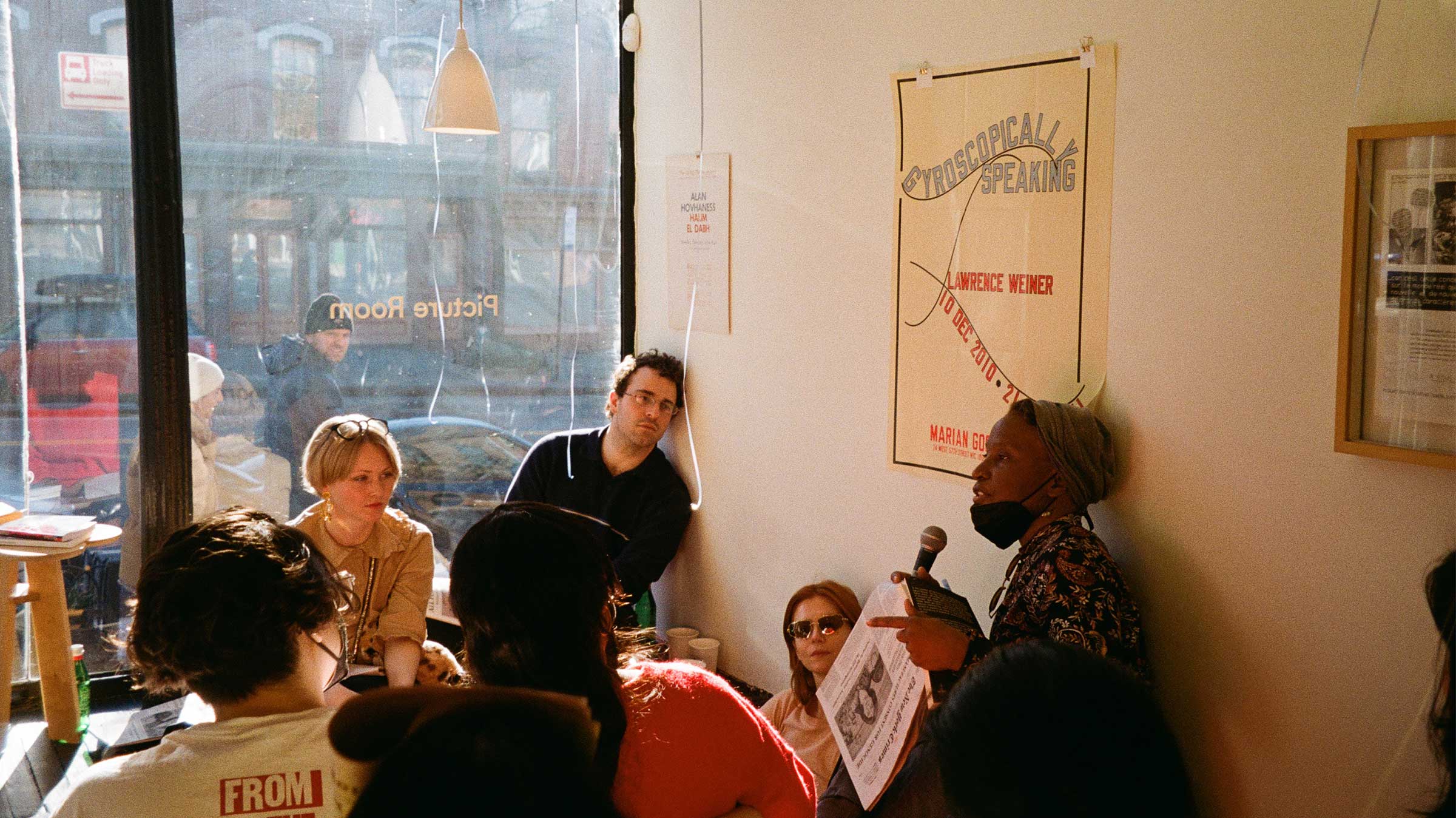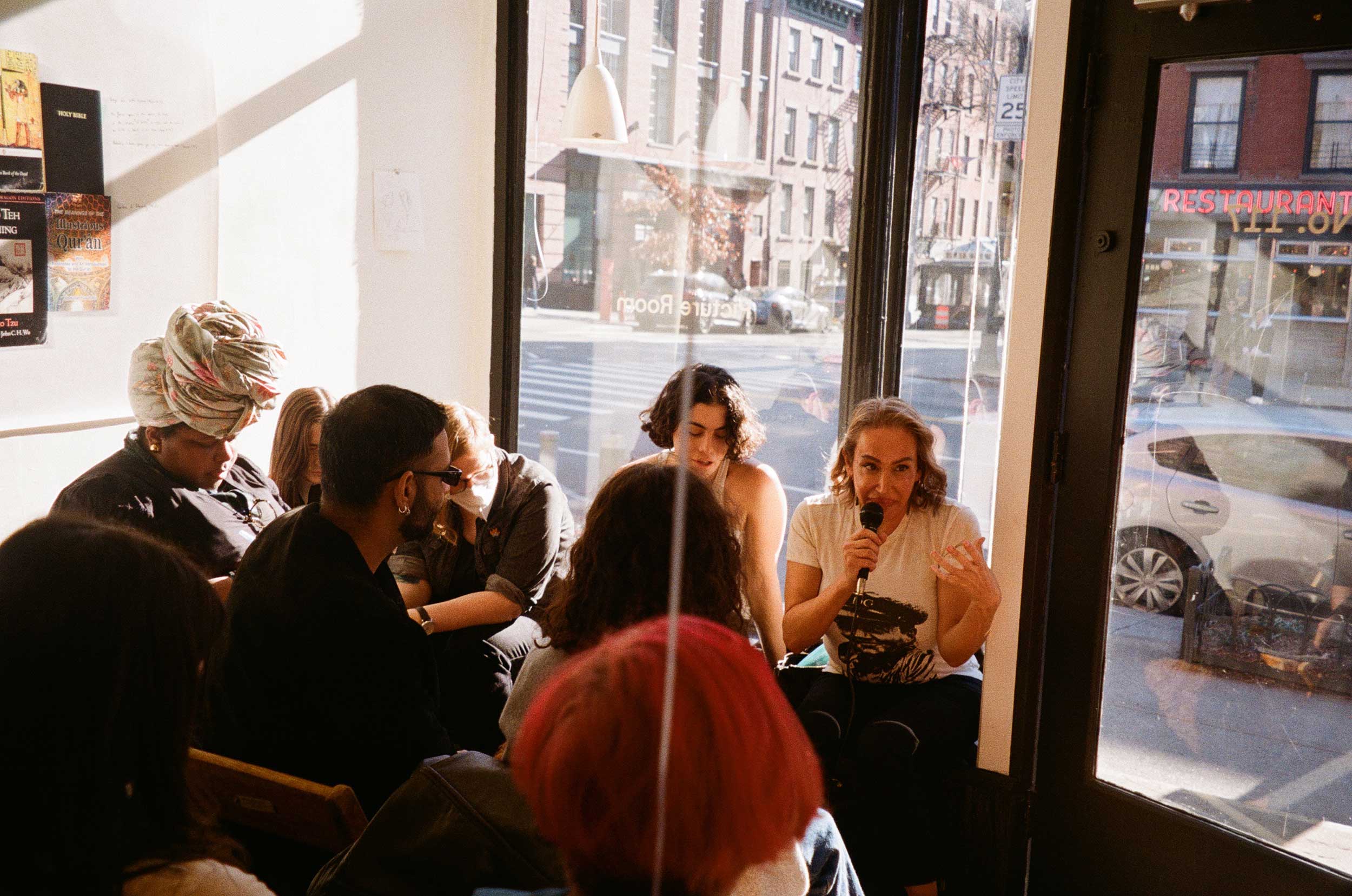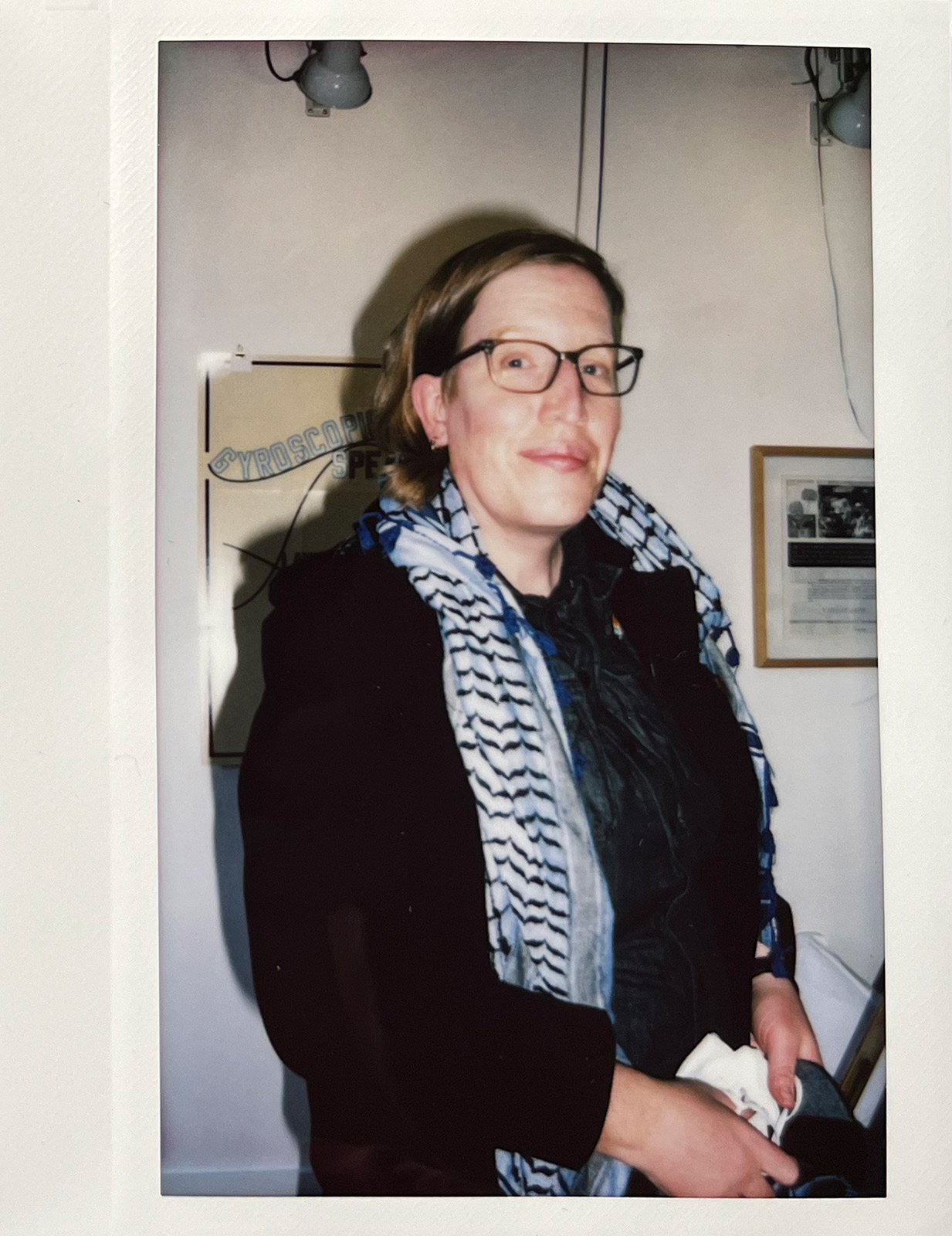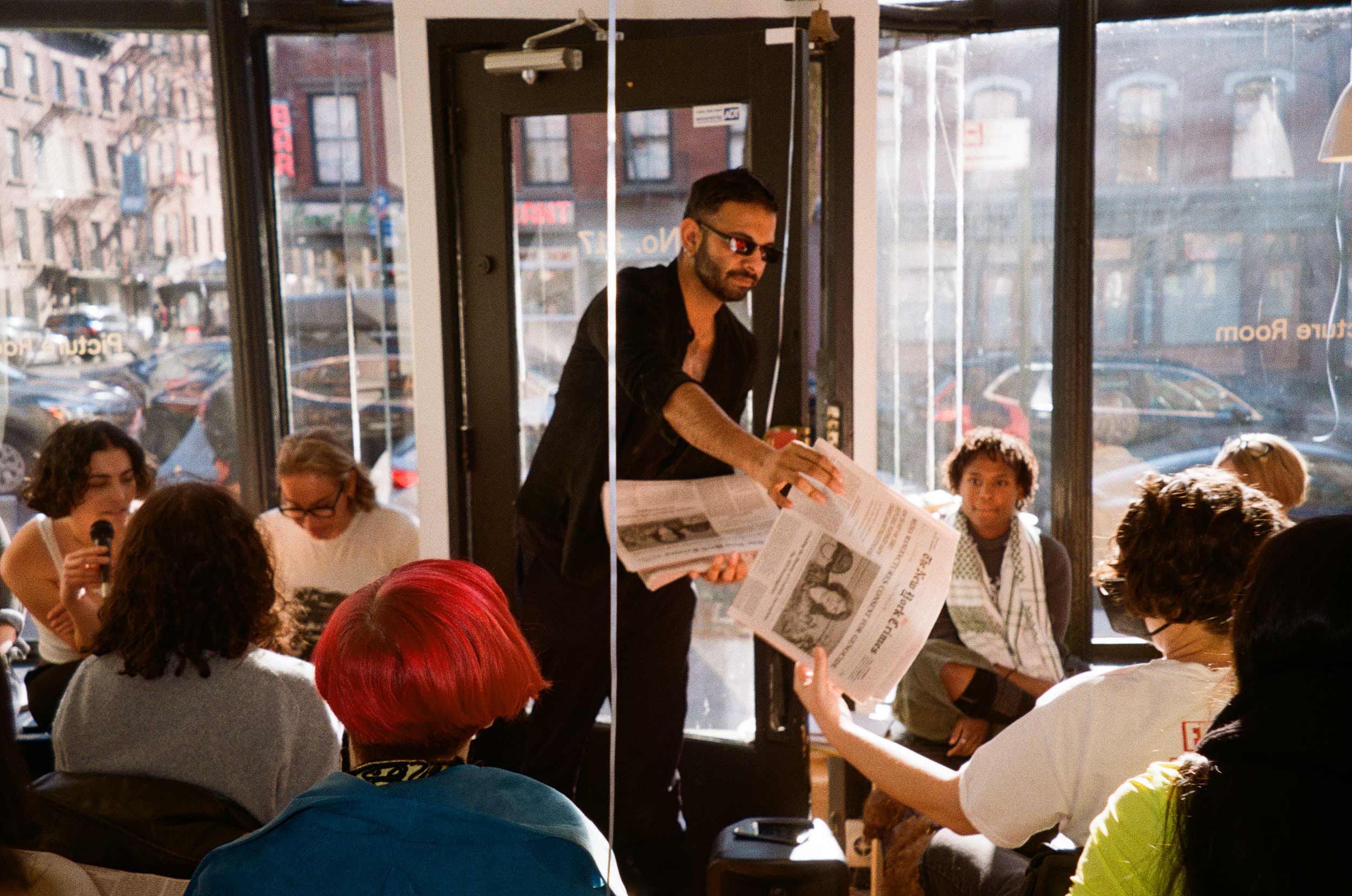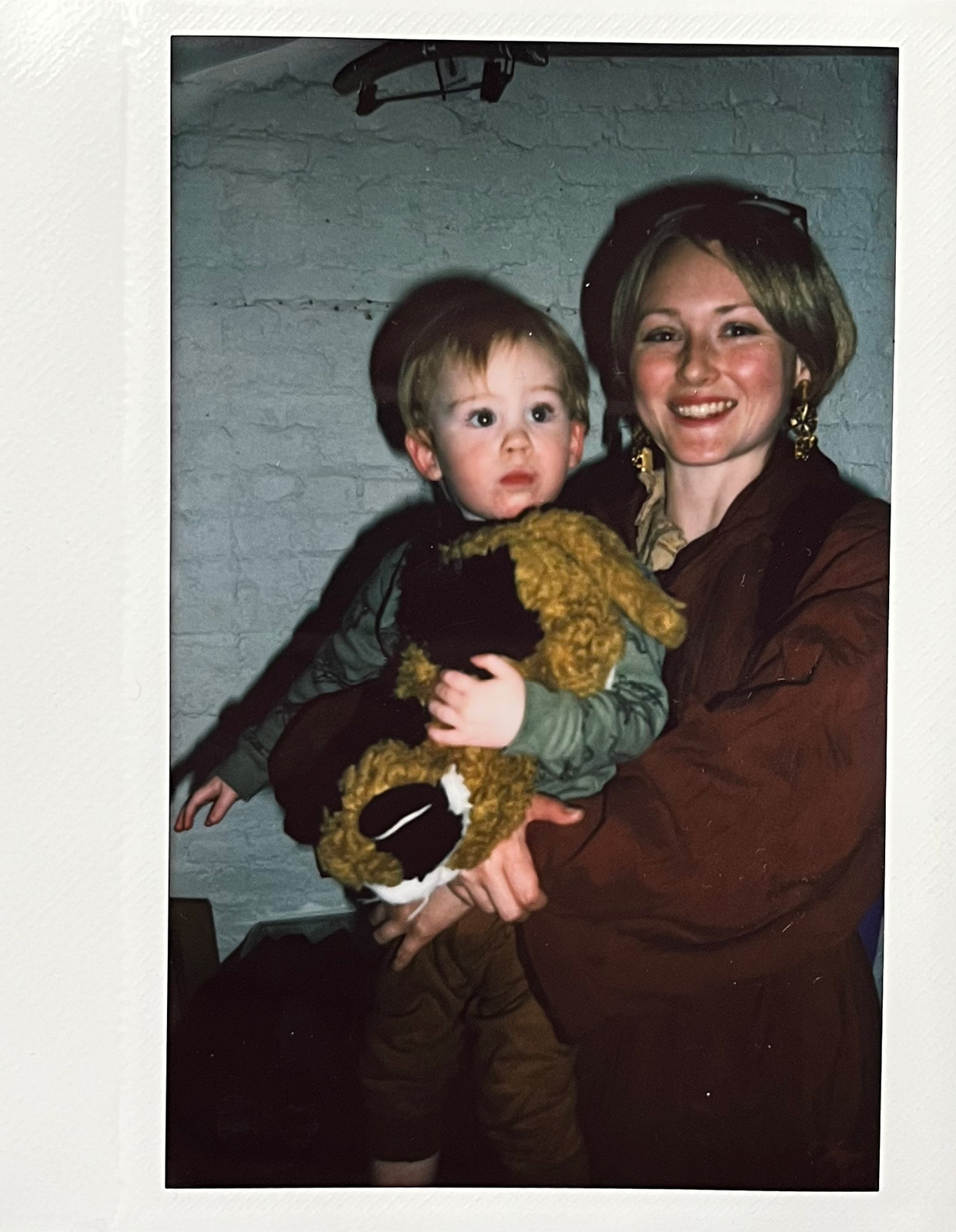In memoriam of storyteller Cecilia Gentili, the co-organizers reflect on their winter conversations program which united writers and activists to discuss our political moment
The sun hadn’t shone for weeks, but it did when we gathered on Saturday, February 3 at the Brooklyn Heights gallery Picture Room to listen to Cecilia Gentili, Joy James, Johanna Lee Owen, Elena Comay del Junco, and Pilar Maschi with M.E. O’Brien of Pinko. Organized by John Belknap and Fiona Alison Duncan, our event brought together writers and activists who could speak to the moment—to the mess of being alive simultaneous to genocide and global “weirding,” and the ways that listening, taking care, and community contour life, giving it substance beyond its form.
The latest expression of Hard to Read—Duncan’s long-standing literary series—the event inaugurated a pop-up shop and exhibition drawn from Picture Room and Hard to Read’s archives. Prints by Maia Ruth Lee, Dan Graham, Adjua Gargi Nzinga Greaves, and The Living Theatre hugged the walls as balloons by Sojourner Truth Parsons floated like ghosts across the ceiling.
Poet Shiv Kotecha and Chase Bell co-hosted a conversation with the invited luminaries. Gentili read from her tour de force memoir, Faltas. James shared from her revelatory book, New Bones Abolition. Owen reflected on burial rituals and Comay del Junco on the collectively published The New York War Crimes. O’Brien and Maschi read from Pinko’s activist oral history, After Accountability.
Over and over in the performances, grief kept coming up. When Gentili passed away, just three days after the event, grief buckled time.
A community activist and actress, Gentili was never one to be in search of lost time. She co-founded a free clinic for sex workers at Callen-Lorde Community Health Center, and through DecrimNY, a coalition of organizations representing the needs of sex workers in New York, successfully repealed the “Walking While Trans” law. Powerful and sexy, a beloved mother, performer, organizer, collaborator, and writer, over 1,000 mourners came to her memorial at St. Patrick’s Cathedral on February 15. Tourists flocked, whispering, “What celebrity is this for?”
Saint Cecilia’s spirit remains alive on the pages of her book, just as she kept so many people alive and going. We’re so grateful to be able to share this, finally: Gentili, in her own words, describing how her book came to be—alongside monologues from each of our speakers. The light!
Cecilia Gentili on her memoir, Faltas: Letters to Everyone in my Hometown Who Isn’t My Rapist (Little Puss Press, 2013)
Cecilia Gentiliti: I’m a storyteller. I started telling stories by mistake, a long time ago, and Cat Fitzpatrick [of Little Puss Press] thought they should be a book. I have so much respect for people who write for a living and really pour themselves into the dramatics. Sometimes it feels intrusive of me to say, ‘I’m a writer.’ But I wrote a book. The beauty of storytelling is that it’s easy to start with something that is true and deviate to something that is not. You can do whatever the fuck you want because nobody knows. It’s your story. I love storytelling that can move from reality to make the ending that you want, the ending that didn’t happen. These are stories from my childhood. I grew up in Argentina under a dictatorship. The best thing that happened in 2023 was that Henry Kissinger died. He was so fundamental in creating such pain in my country, in countries around South America, especially in Chile. I grew up in that kind of environment. As a very queer trans child, it was not easy. I would look at my mom and see how she was ashamed: ‘Why don’t I have a normal child?’ I’d look at her and tell her: ‘Why don’t I have a pretty mom? And why don’t we have money? Why am I the only poor child in this fucking school?’ My mom was the cleaning lady at the school and she was sending me for free because of that. It was very traumatic because everyone was very rich. I was wearing the clothes of kids who gave them to my mom. They would tell me, ‘That was mine before but I don’t like it anymore so I’m glad you like it.’ I was like, ‘I don’t like it but it’s the only thing I have to wear!’
“The beauty of storytelling is that it’s easy to start with something that is true and deviate to something that is not. You can do whatever the fuck you want because nobody knows. It’s your story.”
I am a survivor. I survived specifically one person, one man’s sexual abuse, and the book was just about saying it. The letters I wrote [in the book] were not to him because he’s dead and I didn’t want to give him any power. I wrote to his daughter, and was like, ‘How does it feel to know somebody you love so much’— her father—‘was such a monster?’ The book is being translated into Spanish so she may read it. I want to be with her before she does and be like, ‘Hey, I wrote this thing…’ I’m very interested in how she feels. There is a lot of forgiveness in this book, but there are things you cannot forgive. I cannot forgive this man. I wish I could. I think embracing the lack of forgiveness has been really important for me. One of the reviewers said, ‘This is an angry book,’ and I was like, ‘Oh bitch!’ but then I was like, you know what, you really get it. This is an angry book. There is bitterness and the only way to be less bitter for me and to navigate forgiveness and non-forgiveness was to write this book.
M.E. O’Brien and Pilar Maschi Discussing After Accountability: A Critical Genealogy of a Concept (Pinko, 2023)
M.E. O’Brien: I am here with Pinko, an editorial collective for thinking gay communism. At Pinko, we put out a magazine. In between issues two and three, the George Floyd rebellion happened. We were a part of the periphery of a lot of debates in New York City then about the concept of accountability. We were trying to think through what accountability meant throughout its history, so we decided to go out and interview some of the smartest activists we had ever met, including Pilar Maschi, to see what they had to say about the history of the concept and what it meant in their work. So that’s the book. It’s a transcription of their interviews. We also wrote an introduction and a conclusion where I make an effort to try to answer why accountability fails so much, using a sort of communist analysis of the limits of what we think of as community.
Pilar Maschi: I have been an organizer around prison-industrial complex abolition for 24 years. I’ve done a lot of work with women in substance abuse treatment facilities, where I was a client. I’m a born-and-raised New Yorker and the Bronx is where I concentrate my organizing. In prison-industrial complex abolition, a lot of our discussions sometimes are too weak. We have to be on the ground working with communities that are most impacted. In order to do that, we have to provide direct support. Real support. In order to heal communities, people need basic necessities. I just wanted to say that. This is part of my interview in After Accountability: ‘Language is a vital tool which can be both harmful and positive for abolition. And getting back to the fundamentals: when we talk about accountability, if somebody invests and commits to being an abolitionist, they’re going to have to unlearn all the conditioning that we’ve been subjected to. Things that we don’t even notice we do, that counter abolition. We have to dismantle the prison-industrial complex in our head. I’m not saying I’m excusing people’s behaviors. I am saying I should be able to support some if not all parties involved in an interpersonal conflict. People should be able to inquire, question, and even support anyone in any circumstance, even community members who have harmed within our community. That is abolition.’
“We have to be on the ground working with communities that are most impacted. In order to do that, we have to provide direct support. Real support. In order to heal communities, people need basic necessities.”
Elena Comay del Junco on The New York War Crimes (Writers Against the War on Gaza, 2023-2024)
Elena Comay del Junco: These are print issues of a newspaper that a number of us have been making over the last few month—including myself as well as Muna Mire, who’s sitting in the front row and Peter [Goldberg] in the back, as well as a number of others who aren’t present. This started out as a piece of agitprop for a protest in November against The New York Times for their particularly insidious complicity in the genocide against Palestine. We initially listed the names of martyrs. About 7,000 had just been released by the Gaza Health Ministry in late October and it took us three issues to print all those names. Since then, the breakdown of the health system in Gaza has meant there is no single list of names of people who have been killed by Zionist forces. So we then started using the broadsheet format to print new writing.
“A lot of the writing in it is not by the people who make the physical paper. It’s giving an outlet for other voices, whether anonymous or not, collectively written or not.”
We’ve printed two issues of new material: One is a collective piece of writing by a group of Palestinian and allied feminists analyzing and debunking the really terrible, lurid article presenting tendentious and debunked rape allegations from October 7 in the guise of certainty. The other is a series of letters, new and existing, from political prisoners held by the Israeli occupation in their jails. We’re working on future versions of the paper with The New York Times in sight [as a target] but also thinking about ways to move [different] information through space. The way I am thinking about it is as a collectively made document. A lot of the writing in it is not by the people who make the physical paper. It’s giving an outlet for other voices, whether anonymous or not, collectively written or not.
Note: since the Hard to Read event, the NYWC collective has launched a website at newyorkwarcrimes.com and released a sixth and seventh print issue of writing from and about Palestine.
Johanna Lee Owen on ritual, virtual reality, and grieving
Johanna Lee Owen: I’ve been writing online through social media since I was a teenager. I’d say why I’m here today is honestly through being online. I’m going to read a work in progress. It starts like this: ‘So what’s the worst that could happen if our material world evaporates out of our reach? If our material means of ritual vanish don’t you think we might all go insane? Or can rituals all be transposed into purely symbolic forms. For example, if I need a vase for my ritual, but there is no possible way to obtain a vase in my circumstances, does it suffice to simply imagine a vase in my head? I mean these are the questions we really have to consider if we are going to enter a purely virtual reality.
“What consideration do we give to incomplete resolution of death?”
Theologians really will be confronted with problems like: can communion be taken virtually? At some level I recognize an underlying need for ritual and “order” across the entire human population. Who doesn’t know the feeling of being taunted by that lack of some component we are familiar with in our day? Most people, I would think, have some demand for their burials to go a certain way. We imagine that our souls need some kind of particular ceremony to pass on in the correct way. Or maybe we just find some form of burial dignified and others not. So what consideration do we give to incomplete resolution of death? That is, people who never received the funeral their religion ascribed to them, or who were never found, never put to rest, never identified, whose remains were disturbed, whose souls were dishonored? What profound effects does the material world have on the spiritual world and if the answer is ‘none,’ then why do we bother with these processes meant to put us in touch with ‘the other side’ at all? What is it doing for us? What is “grieving”?’
Joy James on growing up reading and her book New Bones Abolition: Captive Maternal Agency and the (After)life of Erica Garner (Common Notions, 2023)
Joy James: I grew up reading to avoid my family. Then I was the weirdest kid in Texas: a Black girl who spoke Elizabethan English because I would only read Shakespeare. If you’re reading Tolstoy or something at 11, just to avoid your kinfolk, when you’re integrated in the rest of society, you really are bizarre. Because I had lived in books, and climbed into treehouses to avoid people and read books, I think that’s how I could get through the academy, even though I kept ditching classes to organize, and I walked away from my dissertation (I was trying to write about South Africa, and apartheid, and linking it with Hannah Arendt). I think the love of learning, not for acquisition or status, but the love of learning for sanity is what makes us brilliant, and then it becomes shared. I want to thank you for the New York Crimes thing. It reminds me of all the creativity we have in terms of resisting genocide. When the Center for Constitutional Rights were first charging the US with complicity in genocide, we created bookmarks, because we found people have a fetish for bookmarks. There’s a QR code on the bookmark that can take you to the full statement from the Center for Constitutional Rights. Today, I brought bookmarks for the Captive Maternal Agency and the (After)life of Erica Garner. The proceeds from this book go to Prison Radio. [Ed: Prison Radio’s mission is to include the voices of incarcerated people in the public debate.] I’m clear that Captive Maternal is not a biography of Erica Garner. It talks about different aspects of struggle in which we see our caretaking moving to resistance, to marronage, and especially to confrontation with war. I was asked by Chase, ‘How does the captive maternal grieve?’ There is a strong possibility that I don’t have an answer that would satisfy. But I really appreciate the collective understanding that the line between life and death is blurry. Maybe you cross over and cross back—emotionally, psychologically—multiple times. I think Leonard Cohen has this lyric in one of his songs: that’s when the light comes in. Spirituality, then, is essential but maybe not the last word on redemption. Maybe it’s just opening the portal? More and more I think about resistance, not resistance against spirituality, but a resistance to predatory culture which is a 360-degree lap. There’s also beauty, there’s also possibilities, there’s always a struggle. I think without spirit or spirits in the plural, I would be ugly but a very efficient antagonist against the state. My preference is not to be beautiful, but to let the light come in. And to continue in resistance, but with the spirit as a guide.
Thanks to Sandeep Salter and Ellie Hunter for facilitating Hard to Read at Picture Room and to Isobel for transcribing. You can listen to the full audio here.


